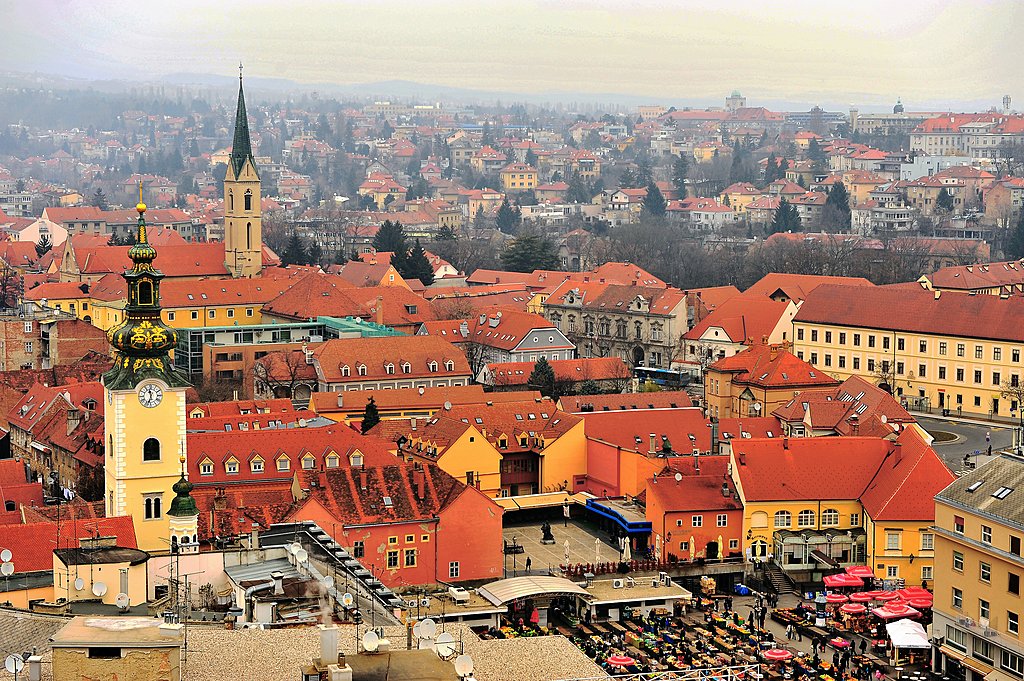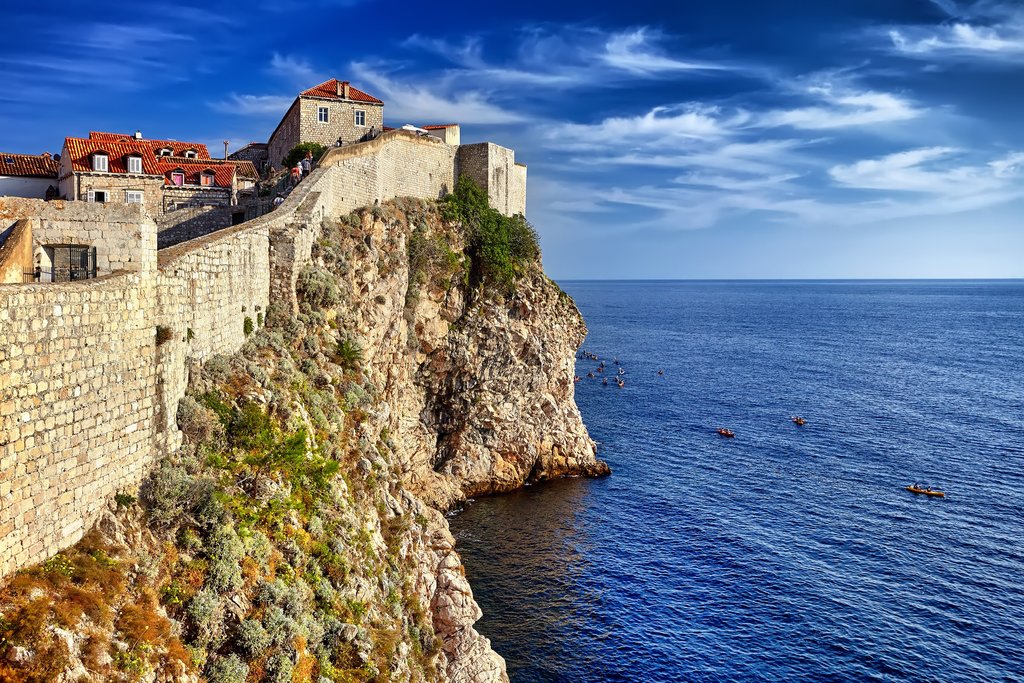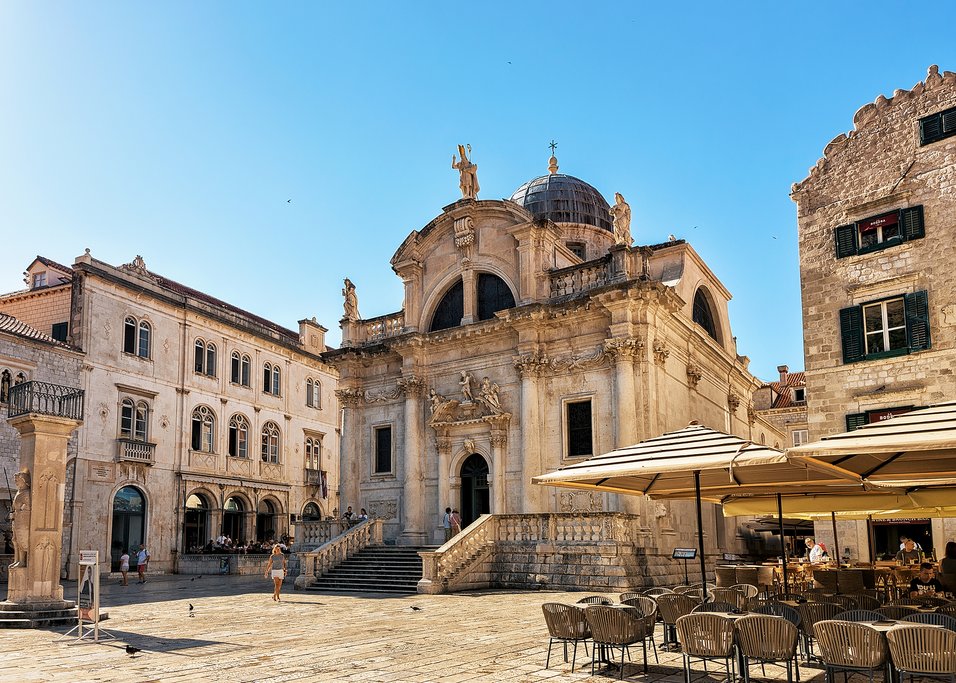Highlights
- Visit the open-air markets of Ban Jelacic Square in medieval Zagreb
- Listen to the sea organ of Zadar and explore its storied alleyways
- Admire the impressive Skradinski Buk waterfalls in Krka National Park
- Marvel at Split's stone sphinxes brought back from Egypt 3,500 years ago
- Explore the 16th-century walls of Dubrovnik's Lovrijenac and Revelin fortresses
Brief Itinerary
| Day | Highlights | Overnight |
|---|---|---|
| Day 1 | Arrive in Zagreb, Explore | Zagreb |
| Day 2 | Drive to Plitvice Lakes National Park | Plitvice Lakes National Park |
| Day 3 | Drive to Zadar, Explore | Zadar |
| Day 4 | Drive to Split, Visit Krka National Park | Split |
| Day 5 | Ferry to Hvar, Sunset Sea Kayaking Tour | Hvar Town |
| Day 6 | Hvar Wine Tasting | Hvar Town |
| Day 7 | Ferry to Dubrovnik, Explore | Dubrovnik |
| Day 8 | Historical Walking Tour of Dubrovnik | Dubrovnik |
| Day 9 | Depart Dubrovnik |
Detailed Itinerary
Day 1: Arrive in Zagreb, Explore

Start your adventure in Zagreb, the capital of Croatia. Upon arrival at the airport, you'll be transferred to your hotel to settle in. The rest of the day is yours to spend as you like. The city center is easily walkable, and the streets and parks are easy to navigate on foot. All the main attractions and restaurants are within walking distance.
A gem of a European city, Zagreb is at once historic and new. It's filled with leafy green parks and Gothic/neo-renaissance buildings, yet there are also modern shopping complexes, outdoor malls, and endless dining and drinking options. Consider heading out on a guided walking tour of the historic heart of the city. This involves walking from the main square to Zagreb's Upper Town and passing through local markets before reaching St. Mark's Square.
Alternatively, you can visit one of the many museums and art galleries, like the Homeland War Museum, the Nikola Tesla Technical Museum, or the ever-popular Museum of Broken Hearts. Or stroll through the city center, enjoying 17th-century neo-baroque architecture found at Zagreb's Art Pavilion and Croatian National Theater.
Zagreb also has a number of beautiful city parks, which are great for exploring and people-watching, especially in the late afternoon. Maksimir is a great option, with a variety of cafés nearby to pick up a coffee for your stroll.
Day 2: Drive to Plitvice Lakes National Park

Today, you'll make the drive south to Plitvice Lakes National Park, one of Croatia's most popular national parks. Along the way, make a point to stop at Rastoke. Rastoke is a small village known for its old watermills and beautiful waterfalls as two rivers converge in the area. This is a nice precursor of the sights to come at Plitvice Lakes.
A short drive later, you'll arrive at Plitvice Lakes National Park in the early afternoon and can explore the park at your leisure. A must-visit for any traveler to Croatia, the UNESCO-protected park is comprised of an exquisite collection of 16 glassy emerald green and blue travertine lakes, more than 90 cascading waterfalls that seemingly cover every corner of the park and numerous caves. The terraced lakes are surrounded by beech and pine forests and are home to extensive wildlife.
Choose one of eight different hiking trails, ranging from three to eight hours in duration, where the upper lakes tend to be less crowded during the peak season. You may wish to bring a bought lunch (and a bottle of wine!) with you to enjoy a picnic. Tickets are purchased at the entrance of the Park.
Driving time (Zagreb to Rastoke): 1.5-2 hours
Day 3: Drive to Zadar, Explore

In the morning, continue your drive south from Plitvice to the ancient Roman city of Zadar. A historical center of the Dalmatian Coast, Zadar is famous for its picturesque coastline full of islands and vibrant blue waters, as well as fresh seafood and unforgettable sunsets.
Take the rest of the day to relax and explore. You may wish to stroll along Zadar's Riva, a wide ribbon of stone paths bordered by a grassy park on one side and the sea on the other. It runs along Old Town's waterfront, where it comes alive at night with vendors and Dalmatian capella groups called klapa that serenade the passersby, including folks on yachts who dock there.
Take in the sunset (Alfred Hitchcock is on record saying they're the best in Zadar) from Café Brazil before discovering the pretty patterned lights of the Monument to the Sun while listening to the nearby Sea Organ.
Driving time: 1.5-2 hours
Chat with a local specialist who can help organize your trip.
Day 4: Drive to Split, Visit Krka National Park

After breakfast, you'll drive south toward Split, stopping at Krka National Park and the charming coastal towns of Primošten and Trogir. With seven waterfalls—the largest and most impressive being Skradinski Buk—Krka National Park is one of eight national parks in Croatia. The Krka River, another highlight of the park, carves through the limestone and creates a spectacular canyon on its 44-mile journey (70 km) from the foothills of the Dinaric Alps to Šibenik.
Follow the winding wooden paths that traverse emerald pools to viewpoints of the majestic series of falls and enjoy a quick swim if the mood strikes. One great section to explore starts at Skradinski Buk. From there, head to Roški Slap, where you can take a short walk across the river to a small set of rapids, said to resemble a pearl necklace from above. At Roški Slap, you can stop to grab a bite to eat locally-produced prosciutto, cheese, and seasonal salads.
Come mid-afternoon, travel farther south to Split, settling into your hotel before taking the rest of the afternoon to wander its historic center. Start at Pjaca Square for pretty views of white marble tiles, the Iron Gate (the western entrance to Diocletian's Palace), a Romanesque clock tower with the remains of a medieval sundial, and the 15th-century Town Hall. Next, visit the popular Voćni trg or Fruit Square to enjoy Renaissance architecture, influenced during Split's Venetian era.
For a bit of shopping and a bite to eat, head to Marmont Street, though you'll want to find your way to the waterfront to catch the sunset.
Driving time (Zadar to Krka): 1-2 hours
Driving time (Krka to Split): 1.5 hours
Day 5: Ferry to Hvar, Sunset Sea Kayaking Tour

This morning you'll catch a ferry from Split to Hvar and check into your hotel. A Croatian island in the Adriatic Sea, Hvar is a popular destination with tourists due to its natural setting, mild climate, and its historic town of the same name. You'll have the late morning to explore Hvar Town. Visit St. Stephen's Cathedral and climb the steps to the terrace outside of the historic Arsenal to enjoy views over the harbor and the surrounding area.
In the afternoon, pack your swimwear and towel and head to Hvar Town's beachfront for your guided sunset kayaking tour to the nearby Pakleni Islands. The islands are the most beautiful part of the Hvar Riviera and are a favorite retreat for locals seeking to escape the summer heat. Altogether, there are 14 wooded and rocky islets, which you will get a chance to explore by kayak with a striking pink sky as a backdrop.
Ferry time: 1.5-2 hours
Day 6: Hvar Wine Tasting

Join a half-day wine tour to sample some of Croatia's best wines. Immerse yourself in wine country, less than half an hour inland from Hvar Town, and tour wineries, meeting winemakers and exploring UNESCO-protected vineyards where grapes have grown since the time of the ancient Greeks. Hvar's fertile, rich soil produces the rich plavac mali red, grown both locally and on the Dalmatian coast, as well as bogdanuša, a dry white indigenous to the island.
One of the island's most beloved wineries is Tomić, run by Andro Tomić, a well-known winemaker who's famous for his statement, "The way you should drink wine is per hour, not per liters." A popular stop for travelers, be sure to ask to see the basement, which was inspired by the substructures of Diocletian's Palace in Split. Other suggested wineries are Duboković and Plenković.
Day 7: Ferry to Dubrovnik, Explore

After breakfast, board a four-hour ferry to Dubrovnik. Often referred to as the "Pearl of the Adriatic," Dubrovnik is a world-renowned city of exceptional charm. Take some time to explore its 16th-century stone walls, including the Minceta, Lovrijenac, and Revelin fortresses, visit Onofrio's Fountain and the Church of Saint Blaise (St. Vlaho), and stroll along the limestone-paved Stradun, Dubrovnik's main street to get your bearings. Dubrovnik also offers excellent nightlife and some of Croatia's best restaurants and wine bars.
The remainder of the day will be at your leisure, allowing time for you to wander and explore the city. Depending on when you arrive, you may have time to hop aboard a cable car and ride to the top of Srđ Mountain for stunning views of Dubrovnik and the nearby Elafiti Islands. Here you can explore the 19th-century Fort Imperijal (built during the Napoleonic Wars) before stretching your legs and walking back down the hill, enjoying views of the city below.
Day 8: Historical Walking Tour of Dubrovnik

Start your day early (around 8 am) to avoid the crowds and embark on a tour of Dubrovnik, where you'll meet your expert guide outside the entrance to the medieval city at the 16th-century Pile Gate. Entering Old Town, you'll uncover centuries of the city's rich history as you listen to stories of local life and legends and of the importance Dubrovnik once held in the era of the Republic. Highlights include Onofrio's Fountain, the 15th-century Rector's Palace, Luza Square, the Church of St. Blaise (St. Vlaho), and the café-lined streets of Brsalje Street.
After touring the streets and alleys, you'll head for Lovrijenac Fortress as well as the city's impressive defensive walls, the second-largest set of city walls in the world. At certain places, the wall rises 75 feet high, offering excellent vantage points for photos of the coastline.
For the rest of the afternoon, explore Dubrovnik and its surroundings on your own or enjoy the afternoon sun on the nearby beaches. You might want to come early evening so that you can get stunning panoramic views over the city and Adriatic by taking the cable car up to Srđ Mountain before descending back down for dinner at one of Dubrovnik's great restaurants.
Day 9: Depart Dubrovnik

Depending on when you depart, you may have time to visit one of Dubrovnik's museums, like the Franciscan Monastery and Museum. This large complex houses many treasures, including the world's third-oldest pharmacy dating from 1317.
Alternatively, for a collection of 15,000 pieces of interesting works, visit the Rector's Palace and Cultural Historical Museum. Wander this well-preserved palace-turned-museum and explore its exhibits, some detailing life in the Republic of Ragusa during medieval times.
The drive to the airport from Dubrovnik takes around 45 minutes with normal traffic.
More Great Croatia Itineraries
Looking for more inspiration for your trip to Croatia? Check out these other Croatia itineraries, explore different ways to spend nine days in Croatia, or discover the best time to visit Croatia.
